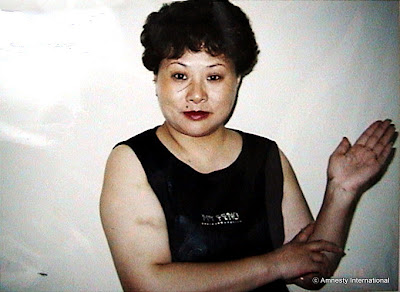Two years ago today it was Liu Xiaobo sentenced to 11 years in prison for “inciting subversion of state power” and today it is Chen Wei condemned to 9 years under the same charge. On March 25, 2011 Liu Xianbin was sentenced to 10 years in prison under the same charge. Today, the BBC reported that Chen Wei told the court he was not guilty and "that democracy will prevail."
All of these activists and many more are being imprisoned for exercising their freedom of expression and are prisoners of conscience. In addition, Chinese dissident Mao Hengfeng has suffered brutal beatings and torture for her human rights activism.

China: Harsh sentence for activist Chen Wei condemned
by Amnesty International
The nine-year jail sentence handed down to activist Chen Wei for writing critical articles about the Communist Party is unacceptable, Amnesty International said today, and urged Chinese authorities to release him immediately and unconditionally.
Chen Wei was sentenced for “inciting subversion of state power”. His lawyer, Zheng Jianwei, said the trial lasted less than two hours and added that his family said he would not appeal.
“Chen Wei is being punished for peacefully expressing his ideas,” said Catherine Baber, Deputy Asia-Pacific Director for Amnesty International.
“I wish we could say we were surprised by this sentence, but we have seen the Chinese government use this vague charge of “incitement” over and over to silence its critics and suppress discussion of human rights and political change,” she added.
According to the indictment, seen by Amnesty International, Chen Wei’s charge stems from essays he allegedly posted online and “sent to overseas organizations,” including New York-based human rights group, Human Rights in China.
“This is the toughest sentence given to anyone who was arrested and charged during the so-called Jasmine crackdown, when the government rounded up activists out of fear for potential demonstrations inspired by the Middle East and North Africa,” Catherine Baber said.
“We think the government is punishing Chen Wei for his many years of activism and trying to send a strong message to any would-be critics.”
Chen Wei, 42, was one of more than 130 activists detained after the U.S.-based news site, Boxun, reported an anonymous appeal for people to stage protests across China last February.
The online call to protest, inspired by the uprisings across the Middle East and North Africa and the “Jasmine Revolution” in Tunisia, led to one of the harshest crackdowns on dissent in China in recent years.
Government critics, bloggers, artists, “netizens” and other activists were detained, the vast majority of whom have been released without charges or on bail.
Authorities in Suining City, Sichuan Province, detained Chen Wei on 20 February and formally arrested him on 28 March. Since then, he has been held at the Suining City Detention Centre. His case was sent back twice to prosecutors because of a lack of evidence.
Zheng Jianwei said he was only able to meet with his client twice. Another lawyer reportedly met with Chen Wei once. The activist has only been allowed to communicate with his family in writing.
Chen Wei served as one of the leaders of the 1989 student democracy movement, for which he was imprisoned until January 1991. In May 1992, authorities arrested him again, this time for commemorating the anniversary of the Tiananmen Square massacre and for organizing a political party. They sentenced him to five years for “counterrevolutionary propaganda and incitement.”
Chinese law does not define the meaning of “subversion,” nor does the law or related regulations or interpretations adequately define what it means to incite others to subvert state power.
Amnesty International is calling on the Chinese government to release other activists who have been held on the vague charge of "inciting subversion of state power," including:
- "Netizen" Liang Haiyi, reportedly taken away by police on 19 February in the northern city of Harbin for sharing videos and information about the "Jasmine Revolution" on the Internet. Liang Haiyi, perhaps the first person to be arrested as part of the Jasmine crackdown, is reportedly being held on suspicion of "inciting subversion" and could be tried at any time.
- Veteran activist Chen Youcai, also known as Chen Xi, who was detained 29 November for being a member of the Guizhou Human Rights Forum, which authorities declared was an illegal organization. Chen Xi could stand trial at any time and, like Chen Wei, could face a harsh sentence due to his long work as a rights advocate.
- Human rights lawyer, Gao Zhisheng, who was sent back to prison last week after “violating” his probation, according to reports in China’s state media. Authorities charged him with “inciting subversion” in December 2006 and sentenced him to a three–year suspended prison sentence. He was initially held under house arrest and then subjected to enforced disappearance repeatedly over nearly three years.
- Nobel Peace Prize Winner Liu Xiaobo, who was awarded the prize in absentia on 10 December 2010. Liu Xiaobo was sentenced in 2009 to 11 years in prison for his role in drafting Charter 08, and other writings which called for democratic reforms. His wife, artist Liu Xia, is under illegal house arrest. She has not been charged with any crime and Amnesty International has called for authorities to immediately restore her freedom.
- Sichuan-based activist Liu Xianbin, who was sentenced in March to 10 years in prison for his role in promoting democratic reform, including his support of the Charter 08 petition movement.
- Beijing-based activist Hu Jia, who was released from prison in June after serving three and a half years for "inciting subversion" but now lives in conditions equivalent to house arrest along with his wife, Zeng Jinyan, and young daughter.







